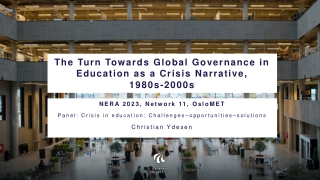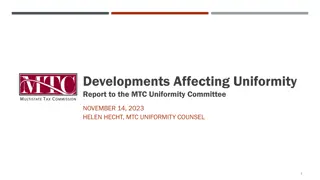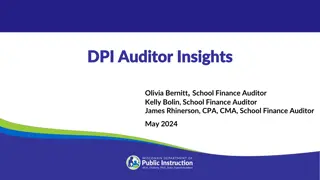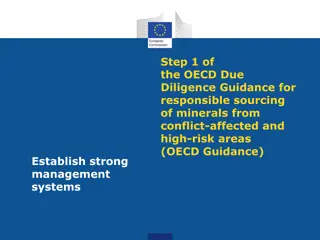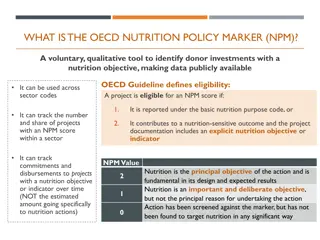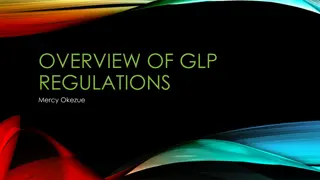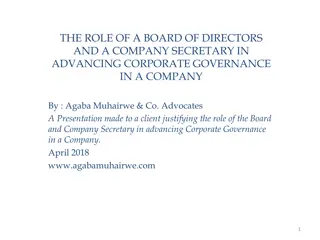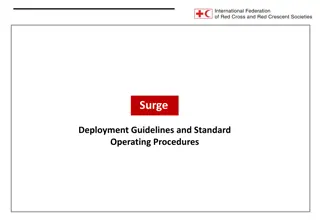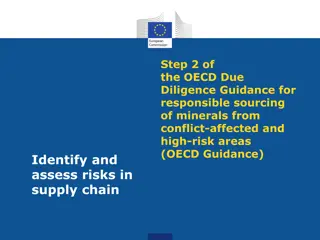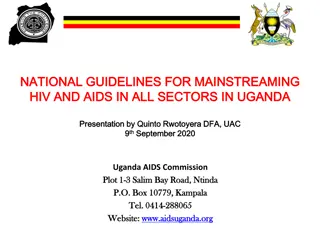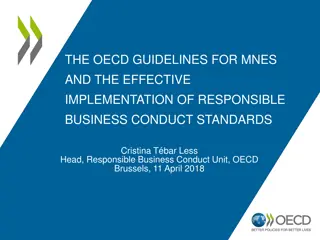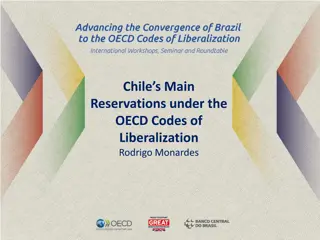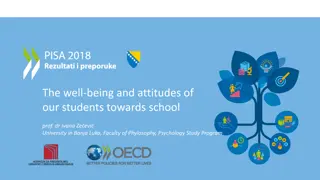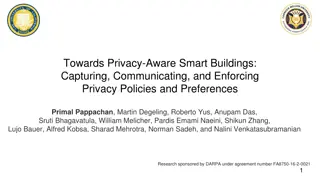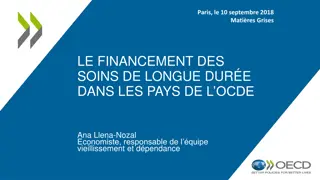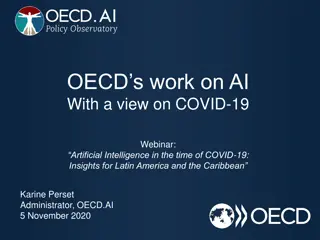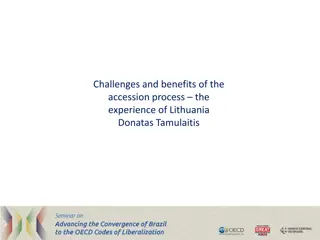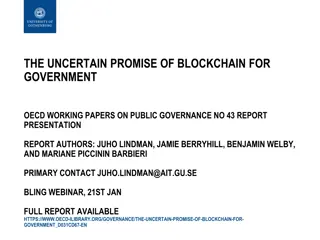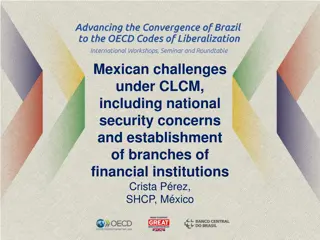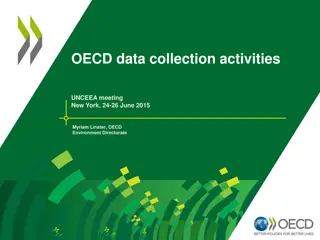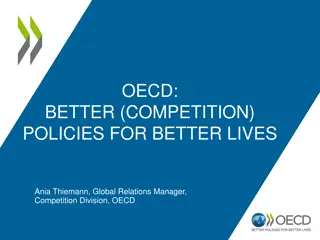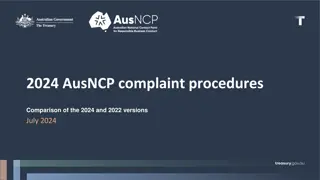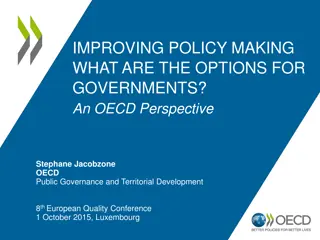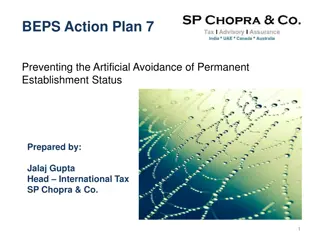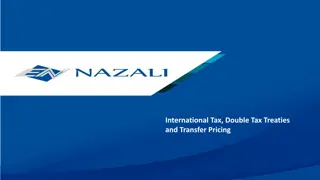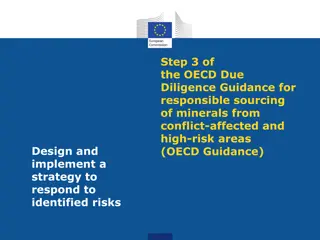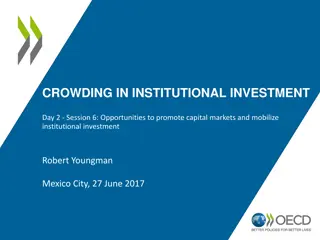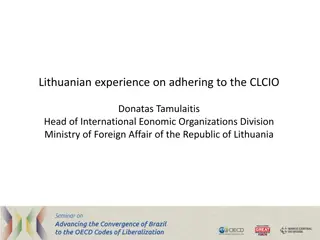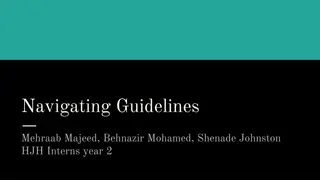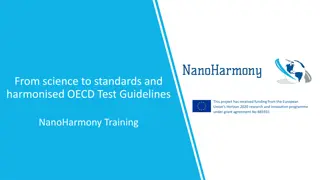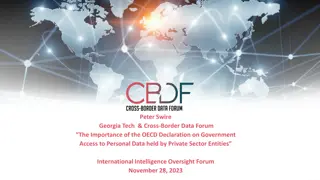Global Governance in Education Crisis Narrative
Explore the shift towards global governance in education, focusing on the impact of global learning metrics. The narrative delves into how initiatives like SDG 4 shape education assessment, highlighting challenges like the narrowing of educational agendas and the devaluing of non-measurable learning
2 views • 13 slides
Achieving Effective Delivery of Infrastructure Projects: Insights from OECD Seminar
Infrastructure investments play a crucial role in global development, but their successful delivery is becoming increasingly complex. Issues such as governance, ownership, and policy responsiveness can impact project outcomes. Without strategic management, projects may face challenges like inadequat
0 views • 24 slides
INTEGRITY: A FACTOR FOR EQUALITY THROUGH INCLUSIVE POLICIES
In a global context of growing income inequality, the importance of integrity in fostering equality through inclusive policies is emphasized. The OECD works with Mexico to address issues of inequality, corruption, and declining trust in government, highlighting the need for integrity and competence
0 views • 17 slides
Progress on Development of Code of Conduct for Special Advisers Presentation
Presentation to the Select Committee outlines the overview, dispensation vs OECD standards, elements of the code of conduct, and the draft code emphasizing adherence to the Constitution, ethical conduct, and official duties for Special Advisers in South Africa. It focuses on promoting a capable and
1 views • 10 slides
SUSTAINABLE WATER USE FOR GREEN HYDROGEN PRODUCTION: PRELIMINARY INSIGHTS FROM OECD WORK IN MONGOLIA
Preliminary insights from OECD work in Mongolia discuss the impact of green hydrogen production on water, sustainable approaches, and possible ways forward. The Sustainable Infrastructure Programme in Asia supports the transition towards net-zero infrastructure with a focus on enabling policies, pla
0 views • 14 slides
Challenges and Progress in Chilean Infrastructure Development
The challenges of Public-Private Partnerships (PPPs) in Chile within the framework of best practices and international standards are discussed, highlighting the need for long-term infrastructure planning and enhanced governance. The 2017 OECD Infrastructure Governance Review identified deficiencies
4 views • 40 slides
Challenges and Opportunities in Monitoring and Evaluation in OECD Countries
Monitoring and evaluation in OECD countries present unique challenges and opportunities, requiring clear mandates, ongoing processes, and robust institutional frameworks. The OECD approach emphasizes fostering quality, ensuring impact, and sharing lessons learned for efficient resource management. I
2 views • 12 slides
Developments Affecting Uniformity Report to the MTC Uniformity Committee
Market-based sourcing models and OECD's Pillar One framework are detailed in the report by Helen Hecht to the MTC Uniformity Committee. The report discusses the challenges of sourcing income from the digital economy and emphasizes the importance of using reliable methods for market-based sourcing pr
0 views • 35 slides
DPI Auditor Insights and State Audit Guidelines Overview
This collection of images and descriptions provides insights into DPI Auditor activities, state audit guidelines, and updates related to state major program determinations. The State Single Audit Guidelines for Wisconsin School Districts are highlighted, along with the State Audit Manual overview an
3 views • 36 slides
OECD Due Diligence Guidance: Establish Strong Management Systems
The OECD Due Diligence Guidance outlines the importance of establishing strong management systems for responsible sourcing of minerals from conflict-affected and high-risk areas. This involves adopting company policies, engaging with suppliers, implementing grievance mechanisms, and utilizing the 3P
0 views • 13 slides
Understanding the OECD Nutrition Policy Marker (NPM)
The OECD Nutrition Policy Marker (NPM) is a voluntary tool to identify donor investments with a nutrition objective. It helps mainstream nutrition in large-scale programs to improve outcomes and accountability. The NPM is applied at the project level to track investments and promote transparency in
1 views • 4 slides
Understanding the US Homicide Epidemic: A Comparative Analysis
The statistics on homicides and gun-related homicides in the US are derived from death certificates and FBI reports, revealing a concerning trend of violence compared to other OECD countries. Variances in homicide rates by location and demographics are highlighted, with alarming rates in cities like
0 views • 26 slides
Albanian National Financial Education Strategy 2022-2027
The Albanian National Financial Education Strategy (NFES) aims to promote financial education for individuals, households, and MSMEs to enhance financial well-being and economic stability. It focuses on key interventions, foundational enablers, institutional coordination, funding, and monitoring. Fi
0 views • 19 slides
Understanding GLP Regulations and Implementation
GLP regulations were established in response to poor practices in toxicology laboratories, with a focus on ensuring quality in non-clinical health and environmental studies. The birth of GLP in the 1970s led to the development of international standards, outlined by the OECD Principles. GLP aims to
6 views • 11 slides
Understanding the Role of a Board of Directors and Company Secretary in Corporate Governance
Strong corporate governance is crucial for business performance, as it involves the system of rules, practices, and processes that direct and control a company. In Uganda, the Companies Act of 2012 governs corporate governance, with a voluntary code for private companies and mandatory for new public
1 views • 21 slides
Surge Deployment Guidelines and Standard Operating Procedures
Surge Deployment Guidelines and Standard Operating Procedures outline the principles and processes for deploying specialized personnel to support humanitarian operations in various emergencies. The guidelines aim to ensure equal opportunity, transparent processes, and quality responses among Red Cro
0 views • 12 slides
Responsible Sourcing in Conflict-Affected Areas: OECD Guidelines
The OECD Due Diligence Guidance outlines steps for companies to identify and assess risks in mineral supply chains from conflict-affected and high-risk areas. It explains Conflict-Affected and High-Risk Areas (CAHRAs) and the importance of due diligence in responsible mineral sourcing to avoid finan
4 views • 16 slides
Mainstreaming HIV and AIDS in Uganda: Guidelines and Initiatives
The presentation by Quinto Rwotoyera from Uganda AIDS Commission discusses the national guidelines for mainstreaming HIV and AIDS in all sectors in Uganda. The content covers the existing policy and guidelines, overview of the presidential FastTrack initiative, objectives of the guidelines, users of
0 views • 28 slides
OECD Guidelines for Responsible Business Conduct
The OECD Guidelines for Multinational Enterprises provide a framework for responsible business conduct, encouraging sustainable practices and minimizing negative impacts. The OECD's work on responsible business conduct focuses on enhancing economic and social well-being globally, emphasizing ethical
1 views • 30 slides
Chile's Financial Services Liberalization Overview
This content provides an in-depth look at Chile's main reservations under the OECD Codes of Liberalization, including its context of accession to OECD Free Trade Agreements and commitments to liberalization in services, investments, and financial services. It covers aspects such as cross-border trad
5 views • 20 slides
OECD Expert Group on Disparities in National Accounts Work Summary
The OECD Expert Group on Disparities in National Accounts focuses on developing methodology to produce distributional results for household income, consumption, and saving. Their work involves adjusting national accounts totals, identifying relevant variables from micro data sources, imputing missin
0 views • 15 slides
The Well-being and Attitudes of Students Towards School Prof. Dr. Ivana Zečević University
This chapter explores the significance of investing in the well-being and healthy development of students studying at the Faculty of Philosophy, Psychology Study Program, at University in Banja Luka. It delves into subjective assessments of life satisfaction, experiences of negative events, and posi
0 views • 16 slides
Privacy-Aware Smart Buildings: Ensuring Privacy Policies and Preferences
Smart buildings equipped with IoT technology raise concerns about privacy. This research explores capturing, communicating, and enforcing privacy policies and preferences in smart buildings, addressing issues like data collection, user preferences, and policy enforcement based on FTC and OECD guidel
0 views • 24 slides
Financing Long-Term Care in OECD Countries: Insights and Challenges
The funding of long-term care services in OECD countries poses significant financial and organizational challenges, with a growing proportion of the elderly population requiring such services. This article delves into the financing mechanisms, the public funding landscape, and potential reform pathw
0 views • 10 slides
OECD's Work on AI in Response to COVID-19: Insights for Latin America and the Caribbean
OECD is focusing on AI in the context of COVID-19, emphasizing the importance of trustworthy AI for societal benefits. The organization has outlined principles for implementing AI in policies, with a goal of fostering an ecosystem that prioritizes human rights, transparency, accountability, and more
0 views • 18 slides
Challenges and Benefits of OECD Accession Process: Experience of Lithuania
The experience of Lithuania in the OECD accession process involves various objectives like national investment regime improvement, safeguarding measures, and coordination efforts with different ministries. Reservations and challenges in areas such as direct investment, real estate operations, and ba
0 views • 8 slides
The Uncertain Promise of Blockchain for Government - OECD Working Paper
This OECD working paper explores the potential impact of blockchain on government operations. Authored by Juho Lindman, Jamie Berryhill, Benjamin Welby, and Mariane Piccinin Barbieri, the report delves into the opportunities and challenges presented by blockchain technology in public governance. Juh
0 views • 19 slides
Challenges Faced by Mexico Under CLCM and Establishment of Financial Institutions
Mexico faced challenges related to national security concerns and the establishment of branches of financial institutions under the Codes of Liberalisation of Capital Movements (CLCM). The country's entry into the OECD in 1994 marked a significant period of liberalization and reforms, including exte
0 views • 13 slides
OECD Data Collection Activities Overview
OECD's data collection activities include interrelated work streams focusing on environmental data and indicators, database development, green growth, sectoral statistics, and regional analysis. The organization aims to provide comprehensive information to support policy-making and promote global co
0 views • 22 slides
Promoting Better Lives Through OECD's Competition Policies
The OECD's Competition Division works towards promoting fairer development, better education, healthcare, pensions, and employment through its outreach programs and global forums. The Global Forum on Competition engages participants from around the world to discuss topics like fighting corruption, p
0 views • 15 slides
Comparison of 2024 and 2022 AusNCP Complaint Procedures
This document compares the 2024 and 2022 versions of the Australian National Contact Point for Responsible Business Conduct complaint procedures. Changes include updates to align with the OECD Guidelines and emphasize expectations for multinational enterprises operating in or from Australia.
0 views • 19 slides
Enhancing Policy Making: Options for Governments - An OECD Perspective
Various tools and approaches are discussed to improve policy making, including foresight, cost-benefit analysis, and regulatory tools. The changing context of policy challenges is highlighted, along with the OECD policy toolkit's modular approach. Strategies like talking to leaders, engaging stakeho
0 views • 20 slides
Understanding BEPS Action Plan 7: Preventing Artificial Avoidance of Permanent Establishment Status
The Action 7 Report aims to prevent artificial avoidance of Permanent Establishment (PE) status by making changes to the PE definition in the OECD Model Tax Convention. BEPS refers to tax planning strategies exploiting tax rule gaps to shift profits to low-tax locations. The OECD issued 15 action pl
0 views • 10 slides
Understanding Permanent Establishments in International Taxation
Permanent establishments play a crucial role in determining tax liabilities for companies operating across borders. In Turkish corporate taxation, limited liability taxpayers are defined by their place of business and permanent representatives. The OECD Model Convention also provides guidelines on w
0 views • 18 slides
Responding to Risks in OECD Due Diligence Guidance
Develop and implement a strategic response to identified risks in accordance with the OECD Due Diligence Guidance for responsible sourcing of minerals. The process involves reporting findings to management, devising a risk management plan, implementing the plan, and assessing ongoing risks. Mitigati
0 views • 7 slides
Opportunities to Mobilize Institutional Investment in Capital Markets
Aligning trillions of dollars managed by OECD institutional investors towards green infrastructure investments presents a significant opportunity. Currently, only a small percentage of large pension fund assets are directed towards infrastructure, with an even smaller fraction allocated to green pro
0 views • 4 slides
Lithuanian Journey Towards OECD Accession: Key Coordination Efforts
Lithuanian's experience in adhering to the CLCIO, coordinated by Donatas Tamulaitis, focuses on various processes including OECD accession, communication with Member states, management of recommendations, and more. The journey started in 2014 with the initial list of reservations and progressed thro
0 views • 14 slides
Understanding Medical Guidelines and Their Impact on Healthcare Practices
Medical guidelines play a crucial role in guiding decisions related to diagnosis, management, and treatment in healthcare. They are generated through a structured process involving data collection, evidence prioritization, and consensus among experts. These guidelines, whether at national, regional,
0 views • 16 slides
NanoHarmony Training: Standards and OECD Guidelines Overview
Delve into the world of standards and OECD Test Guidelines with the NanoHarmony Training material. Learn about harmonized test methods, the role of science in guideline development, engagement with OECD committees, and the process of creating OECD Test Guidelines. Explore how stakeholders can contri
0 views • 16 slides
Challenges and Importance of Government Access to Personal Data in Cross-Border Intelligence Oversight
Reflecting on the significance of the OECD Declaration on Government Access to Personal Data held by Private Sector Entities, this content delves into the drivers necessitating an OECD-type process, such as law enforcement needs, globalization of criminal evidence, and convergence of civilian commun
0 views • 8 slides
